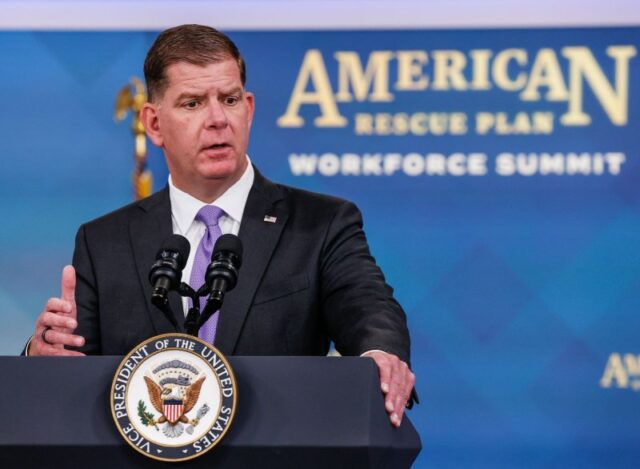Sept. 13 (UPI) — President Joe Biden and his administration have been active in the talks between railroad companies and unions in a potential strike that could derail the economy and create new supply chain headaches.
Labor Secretary Marty Walsh, Transportation Secretary Pete Buttigieg and Agriculture Secretary Tom Vilsack have all played some role in working with all parties to push them to agreements without a work stoppage.
Brotherhood of Locomotive Engineers and Trainmen as well as the SMART Transportation Division, which represents some 57,000 workers, have been engaged in negotiations with rail carriers seeking to hammer out a new contract without success. They are currently in a federally mandated “cooling off” period until Friday.
Walsh personally took part in negotiations last week while Amtrak has already announced the cancellation of three of its longest routes in anticipation of a strike. Amtrak announced it will cancel its Southwest Chief, California Zephyr and Empire Builder routes that run between Chicago and the West Coast effective Tuesday. Amtrak said it operates most of its 21,000 miles, outside the Northeast, “on track owned, maintained and dispatched by freight railroads.”
Norfolk Southern said Monday that it started to close all of its gates to intermodal traffic.
“Although negotiations with the two holdout unions continue, we still do not have a commitment not to strike and must act accordingly,” Norfolk Southern said in a statement Sunday. “Our goal is to ensure that in the event of a work stoppage, crews, equipment and freight safely reach their destinations with minimal disruption.”
A Labor Department spokesman said Walsh is urging both parties to keep working to an agreement.
“All parties need to stay at the table, bargain in good faith to resolve outstanding issues, and come to an agreement,” the spokesperson told The Hill. “The fact that we are already seeing some impacts of contingency planning by railways again demonstrates that a shutdown of our freight rail system is an unacceptable outcome for our economy and the American people, and all parties must work to avoid that.”
Last week, the American Trucking Association asked Congressional leaders to intervene to prevent a walkout and “avoid debilitating and unnecessary labor disruption that could cost the country billions each day.”
“While trucking and rail companies compete for ground freight, trucking is also the largest customer of the rail industry, and both industries rely on each other to keep our supply chains healthy and efficient,” Chris Spear, president of American Trucking Associations, said in the letter.
The Association of American Railroads trade group warns the first national railroad strike in 30 years could cost the country $2 billion a day.
Meanwhile, the National Grain and Feed Association warned Capitol Hill that a rail strike would cause havoc in the entire economy with grain shipments coming to an end for some railroads as early as Wednesday.
“The railroads are already stopping shipments of certain commodities such as hazardous materials, chemicals, etc.,” NGFA chief economist Max Fisher said, according to The Daily Scoop.com. “We’re hearing grain shipments on some railroads could stop as soon as Wednesday.”
Sheri Walsh contributed to this report

COMMENTS
Please let us know if you're having issues with commenting.